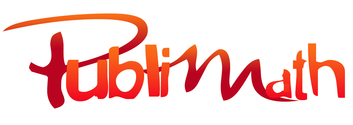History and epistemology in mathematics education: proceedings of the 5th European Summer University. Reflection Upon a « Method for Studying Maths », by José Monteiro Da Rocha (1734-1819). p. 731-739.
(Sur une "méthode d'étude des math"s de José Monteiro Da Rocha (1734-1819).)
Une version texte intégral est en téléchargement sur le site Bibliothèque numérique des IREM et de l’APMEP Télécharger
Auteurs : Ralha Maria Elfrida ; Estrada Maria Fernanda
Résumé
Cet article présente un manuscrit écrit (ver s 1760) par le prêtre portugais (et très influent érudit durant la réforme de l’Université de Coimbra) José Monteiro da Rocha ,en introduction à un cours de mathématiques. A cette époque, l’étude des mathématiques ainsi que d’autres domaines était à un niveau si bas que certains chercheurs, comme l’auteur, se préoccupaient beaucoup du contenu de l’apprentissage ainsi que des méthodes d’apprentissage. Dans ce travail l’auteur souligne le manque d’enseignants en mathématiques, tout en « éveillant ses compatriotes de l’état léthargique [dans lequel ils vivaient] ». Il suggère en particulier « d’écrire en langue vulgaire » (portugais plutôt que latin) pour diffuser les connaissances mathématiques parmi les citoyens portugais et il stimule la fierté nationale en rapportant l’exemple des « glorieuses découvertes maritimes » du Portugal. Plan de cet article : Abstract This was a workshop designed to acquaint the participants with a broad spectrum of mathematical ideas and viewpoints presented in a manuscript written, in the 18th century, by the Portuguese priest (and very influential scholar during the reform of the University of Coimbra) José Monteiro
i) un bref résumé sur la vie et l’œuvre de José Monteiro da Rocha, se référant notamment à son activité de conception et de rédaction des règles de la grande réforme de l’Université de Coimbra (1772) où, pour la première fois , une Faculté de Mathématiques a été créée au Portugal. Est également mentionnée son activité en tant que professeur de la même université et ses relations avec les universitaires de Real Academia das Ciências de Lisboa; est également évoquée la diffusion internationale de certains de ses travaux sur l’astronomie.
ii) une référence aux idées / modèles présentés dans d’autres manuels de l’époque de Monteiro da Rocha.
iii) l’analyse de certaines parties spécifiques de l’introduction citée ci-dessus, en les lisant à partir d’une version anglaise du manuscrit original distribué aux participants.
iv) un rapport sur la discussion / réflexion lors de l’atelier sur
– L’actualité des idées de da Rocha, par exemple sur sa compréhension de ce qu’est la connaissance mathématique ;
– Le développement / l’histoire des modèles de présentation /l’ introduction des manuels de mathématiques ;
– Les faits historico-didactiques que nous pouvons apprendre / appliquer, à l’heure actuelle, où l’intérêt pour l’étude des mathématiques diminue.
da Rocha, as an introduction to a mathematics course.
Based on both Monteiro da Rocha’s life and on his own comments on the teaching and learning of mathematics in Portugal, we have strong reasons to date this unpublished manuscript around 1760.
At that time, the study of mathematics as well as the study of other areas, was at such a low level that some scholars were quite concerned with the learning content as well as the methods of learning; as a consequence we can find some important suggestions for dealing with these problems. An example
of this is Luı́s António de Verney’s « Verdadeiro Método de Estudar » (« True Method of Studying »), published in 1750 which acquired quite a large circulation and, even nowadays, is used as a source of research. Less known than Verney’s work, and other similar texts produced all over Europe at that
time, is the above cited manuscript by Monteiro da Rocha. In this work he echoed his concern with the teaching and learning of mathematics, emphasysing the lack of teachers of mathematics while, in his own words, « waking up his nationals from the lethargic state [in which they were living] ». In particular he suggested « writing in vulgar language » (i.e. Portuguese instead of Latin) for spreading mathematical knowledge among Portuguese citizens and he stimulated the national pride by reporting on the example of Portugal’s « glorious maritime discoveries ».
In the present workshop:
i) We presented a brief summary on the life and works of José Monteiro da Rocha, referring, in particular, to his activity in designing and writing the rules for the big reform of the University of Coimbra (1772) where, for the first time, a Faculty of Mathematics was created in Portugal.
We also referred to his activity as a professor of the same university and his relationships with the academics of Real Academia das Ciências de Lisboa; we will also report on the international spreading of some of his works on Astronomy.
ii) We referred to the ideas/models presented in other textbooks of Monteiro da Rocha’s times.
iii) We proposed the analysis of some specific parts of the above cited introduction, by reading them from an English version of the original manuscript distributed to the participants.
iv) We lead a follow-up discussion/reflection on
– The actuality of da Rocha’s ideas, for example on his understanding of what is mathematical knowledge;
– The development/history of the models for presenting/introducing mathematics textbooks;
– The historical-didactical facts that we can learn/apply, at the present time where there is an acknowledged decrease of interest in studying mathematics.
Notes
Chapitre des Actes de la cinquième université d’été (ESU 5).
Données de publication
Éditeur Vydavatelsky Press Prague , 2008 Format 14,8 cm x 21 cm, p. 731-739 Index Bibliogr. p. 737-739
ISBN 80-86843-19-X EAN 9788086843193
Public visé chercheur, enseignant, formateur
Type chapitre d’un ouvrage Langue anglais Support papier
Classification
